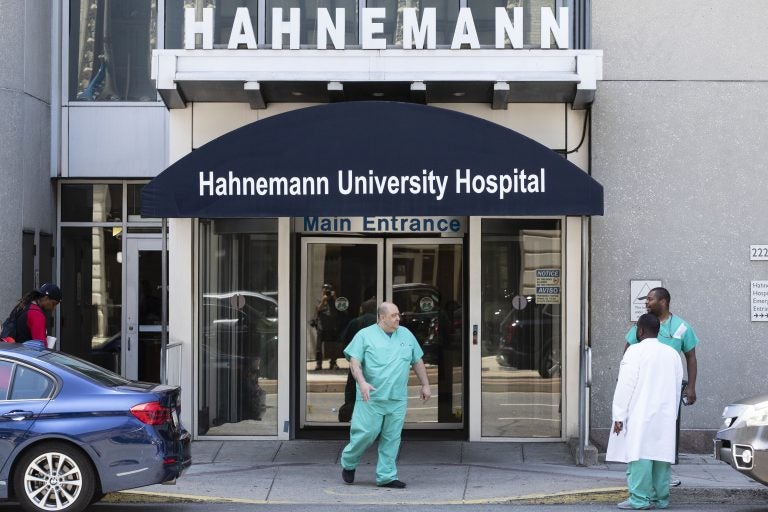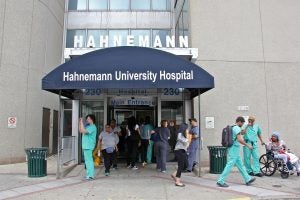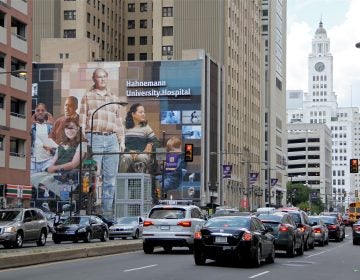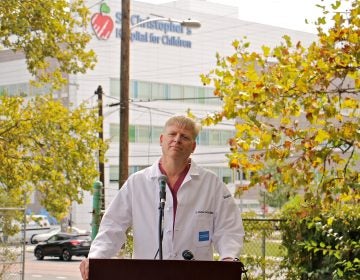Hahnemann no longer receiving trauma patients; ER to remain open
The Center City hospital’s chief medical officer said: “We felt this move is in the best interest of patient safety.”

A person exits Hahnemann University Hospital in Philadelphia, Wednesday, June 26, 2019. (AP Photo/Matt Rourke)
Hahnemann University Hospital has notified the accrediting body that sets standards for trauma centers in Pennsylvania that is de-listing itself as a Level 1 and Level 2 facility, effectively immediately.
The emergency department will continue to remain open — it just will not be accepting trauma patients. Hahnemann’s leadership sent the notice to the Pennsylvania Trauma Systems Foundation Friday night.
“After reviewing our plan of closure and in consultation with the Pennsylvania Department of Health, we felt this move is in the best interest of patient safety. Unfortunately, we are facing clinical and operational challenges. We cannot continue to serve trauma and STEMI patients under these conditions,” Alexander E. Trebelev, chief medical officer at Hahnemann, said, according to a statement issued Saturday by Hahnemann’s owner, Philadelphia Academic Health System.
On Wednesday, Philadelphia Academic announced that the 500-bed hospital and trauma center would shut down by Sept. 6, with emergency services terminating as early as this weekend. Loss of those emergency services as tourists flock to Philadelphia for Fourth of July events was among the concerns cited by Pennsylvania Health Secretary Rachel Levine, whose department issued a cease-and-desist order to Hahnemann’s owner on Thursday.
In the statement issued by Philadelphia Academic Health System Saturday, interim CEO Ron Dreskin said: “We realize the impact this move, and the closure of Hahnemann has on the city of Philadelphia and surrounding neighborhoods, and most importantly, our staff. We wish there could have been a more positive outcome for all. In spite of our best efforts and meetings with numerous city, state, union, insurance carrier, and university officials, a financial solution could not be achieved.”
Hahnemann’s Charles C. Wolferth Trauma Center, completed in 1986, was Philadelphia’s first Level 1-designated trauma center for adults.
The Pennsylvania Trauma Systems Foundation is responsible for establishing standards for accrediting trauma centers at varying levels based on a hospital’s resources and capabilities, its website says.
As described on the website of the American Trauma Society in Falls Church, Va., Level 1 trauma centers provide 24-hour in-house coverage by general surgeons, and prompt availability of care in specialties such as orthopedic surgery, neurosurgery, anesthesiology, emergency medicine, radiology, internal medicine, plastic surgery, oral and maxillofacial, pediatric and critical care.
A Level 2 trauma center provides 24-hour immediate coverage by general surgeons, as well as coverage by the specialties of orthopedic surgery, neurosurgery, anesthesiology, emergency medicine, radiology, and critical care.
Hahnemann’s owner notified the Accreditation Council for Graduate Medical Education, the board that oversees accrediting programs for residents and fellows, that it would file for Chapter 11 bankruptcy Friday with the intent of shutting down the hospital. Hahnemann is the principal teaching hospital for Drexel University’s College of Medicine.
In a post on its website, the accreditation council said that “Hahnemann is anticipated to discontinue hospital operations in coordination with the Pennsylvania Department of Health on or about September 6, 2019, and will shut its doors at a later date to be determined.”
The expected bankruptcy filing came after the state Health Department issued its cease-and-desist letter to the leadership of Philadelphia Academic Health System, ordering it not to shutter the hospital until the department received a formal closure plan.
State Health Secretary Levine met Friday in Harrisburg with officials from the hospital and its owner, her office said in a news release.
“We were pleased to meet today with officials from Hahnemann and Philadelphia Academic Health System to discuss their closure plan, which has been submitted to the department,” Levine said in the statement. “Both parties expressed their commitment to working in a way that protects public health with minimum disruption to patients and staff. We appreciate the owners’ willingness to hear our concerns and their intent to meet our recommendations.”
Representatives from the Health Department were on site at the hospital Friday, Levine’s office confirmed, saying that it was “continuing to monitor the situation at Hahnemann.”
The cease-and-desist order will remain, the statement said, “as further conversation between the department and Hahnemann officials continues.”
Friday morning, several dozen nurses gathered outside the Rittenhouse apartment of Joel Freedman, chairman and CEO of Hahnemann’s parent company, American Academic Health System, to demand that he keep the hospital open. Hundreds of hospital staff rallied alongside Philadelphia City Council members at City Hall at noon Thursday in support of the hospital.
KYW Newsradio reported that the city was seeking an injunction to prevent the hospital from closing.
Hahnemann employs about 3,000 people, primarily at its facility at Broad and Vine streets in Center City. The hospital was purchased in January 2018, along with St. Christopher’s Hospital for Children, by American Academic Health System, parent of Philadelphia Academic Health.
The owner announced 175 layoffs at Hahnemann in April of this year. At the time, American Academic CEO Freedman said that “while St. Christopher’s is generating a profit of about $1.5 million to $2 million per month, Hahnemann has been losing between $3 million and $5 million per month. Lately it’s been closer to $5 million.”
American Academic Health has said St. Christopher’s will remain open.
WHYY is your source for fact-based, in-depth journalism and information. As a nonprofit organization, we rely on financial support from readers like you. Please give today.





